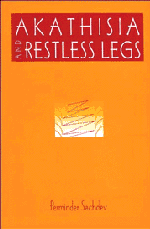Book contents
- Frontmatter
- Contents
- Foreword
- Acknowledgements
- Abbreviations
- Part I Introduction
- Part II Drug-induced akathisia
- Part III Restless legs syndrome
- Part IV Conclusions
- 14 Summary and recommendations for future research
- Appendix A Haskovec's Akathisie
- Appendix B Prince Henry Hospital Akathisia Scale
- Appendix C Barnes (1989) Akathisia Rating Scale
- Appendix D Hillside Akathisia Scale (version 4)
- References
- Index
14 - Summary and recommendations for future research
from Part IV - Conclusions
Published online by Cambridge University Press: 12 September 2009
- Frontmatter
- Contents
- Foreword
- Acknowledgements
- Abbreviations
- Part I Introduction
- Part II Drug-induced akathisia
- Part III Restless legs syndrome
- Part IV Conclusions
- 14 Summary and recommendations for future research
- Appendix A Haskovec's Akathisie
- Appendix B Prince Henry Hospital Akathisia Scale
- Appendix C Barnes (1989) Akathisia Rating Scale
- Appendix D Hillside Akathisia Scale (version 4)
- References
- Index
Summary
Life is the art of drawing conclusions from insufficient premises.
Samuel Butler, Notebooks (1912)Why do some neuropsychiatric patients develop mental and motoric restlessness? What are the determinants of its intensity and duration? What is its pathophysiology? Why do some drugs, used ostensibly to tranquillize behaviourally and emotionally disturbed patients, paradoxically produce restlessness? Why are some drugs that ‘seize the neurone’ disliked by the patients who take them to treat their illnesses? Why are some patients, and families, unable to go to bed for fear of distressing feelings in the legs? How do we help these restless individuals suffer their illnesses in tranquillity? These and many similar questions have been addressed in this book.
The major limitation, repeatedly emphasized, has been the lack of sufficient data. In many ways, the syndromes that we have discussed are too complex and poorly delineated to lend themselves to ‘tight’ research. Many of the phenomena vary from normal behaviours only in degree. Their significantly subjective nature sets up the possibility of trivialization by an unempathic medical and research community. The occurrence of some of the disorders in psychiatrically ill patients further compromises their distinctive nature and associated disability. These are some of the reasons that only a few research groups have attempted to investigate this field. As an example, the contrast between the magnitude of research effort on TD and akathisia in the past 30 years is a testimony to the neglect of ‘restlessness’.
- Type
- Chapter
- Information
- Akathisia and Restless Legs , pp. 345 - 354Publisher: Cambridge University PressPrint publication year: 1995



